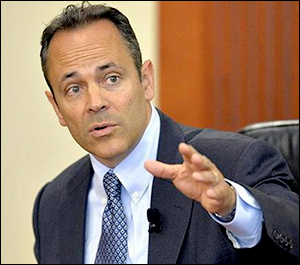By Jim Ellis

Louisiana Gov. John Bel Edwards (D), left, and Republican challenger Eddie Rispone (R)
Late polling suggested a different outcome, as the latest data proposed a trend line where Rispone might have well gone over the top. A new JMC Analytics poll (Nov. 12-13; 600 likely Louisiana voters) showed that Baton Rouge developer Rispone could slip past Gov. Edwards by a 46-45 percent count. The one-point margin was not particularly significant, since the result meant the two candidates were locked in a virtual tie, but the aggregate late-polling trend was more telling.
Since Nov. 1, five studies have been publicly released from five different pollsters and each find the spread ranging from a flat tie to four points. But even the four-point margin, 50-46 percent from Targoz Market Research (Nov. 7-13; 803 likely Louisiana voters) in Edwards’ favor, is inconsistent with the others. Removing this poll, with its strong sample size but long sampling period, means the average percentage difference between the two candidates from the four remaining surveys is only 1.25.
The actual turnout said something different, however, and the first clue came from early voting. According to the latest count on Thursday night, 46 percent of the early votes were coming from Democrats as compared to 38 percent from Republicans. In the jungle primary election, the Democratic early voting advantage was only 44-41 percent, and the GOP candidates secured 52 percent of the vote.
The Daily Kos Elections site authors calculated the percentages that Gov. Edwards would need to attain in key parishes in order to reach 50 percent. We see that the governor reached his projected benchmark in 13 of the 15 representative parishes selected, which accounts for his statewide total.
Over 1.5 million voters participated in the election, meaning a turnout percentage of 50.7 percent of registered voters. This was up 4.8 percent from the recorded primary turnout figure. Four years ago, when Gov. Edwards was first elected in defeating then-US Sen. David Vitter (R), just 40.2 percent of registered Louisiana voters cast their ballots.
Rispone centered his campaign around attacking Edwards over Louisiana ranking near the bottom of state statistics in job creation, and that he was fully in President Trump’s camp. The President came to the state to hold one of his rallies for Rispone, but even this did not help engender a victory.
Edwards’ campaign contended that Louisiana is in the top 10 of fastest growing state economies, that the $2 billion deficit the governor inherited is now a surplus and that was accomplished while increasing teacher pay and expanding Medicare.

 Gov. Matt Bevin (R), always lagging near the bottom of the 50-state gubernatorial approval polls throughout his term, lost his re-election bid to Democratic Attorney General Andy Beshear.
Gov. Matt Bevin (R), always lagging near the bottom of the 50-state gubernatorial approval polls throughout his term, lost his re-election bid to Democratic Attorney General Andy Beshear. 
